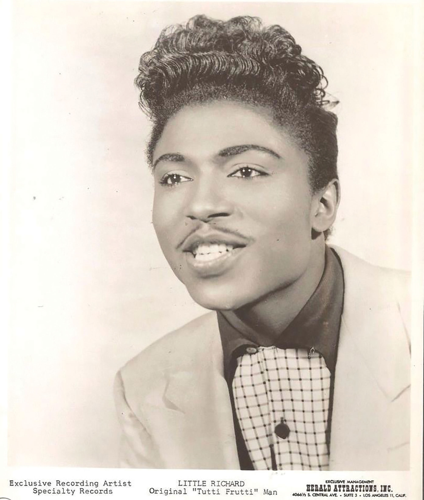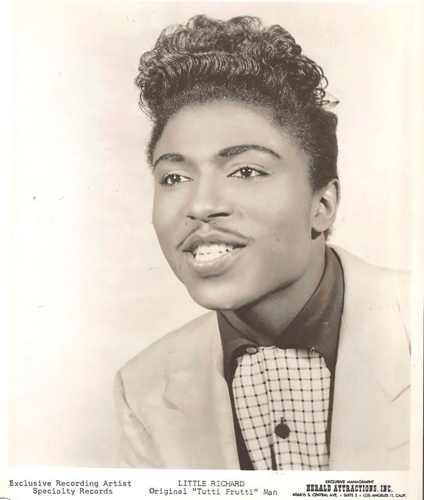
“Titanic” might not be an adequate enough word to describe the impact of Little Richard on the course of American popular music. Born Richard Wayne Penniman in Macon, Ga., the artist fused a host of elements into a majestic, totally distinctive, personal approach. Richard continually alternated between the search for salvation and the pursuit of ecstasy, blurring and obliterating gender norms while combining boogie-woogie and gospel piano licks with robust shouts and theatrical flamboyance, melding influences from the church, strip joints and dirt-floor honky-tonks. He spent much of the last decade of his life in the Nashville area, and on May 10, he died at age 87 of bone cancer at a family member’s home in Tullahoma, Tenn.
While Richard certainly absorbed aspects of other artists’ styles — notably Billy Wright’s piano pounding, Marion Williams’ gospel whoop and Esquerita’s androgynous flair — he accelerated and converged those qualities. The persona he created electrified and galvanized generations of youngsters and performers while simultaneously horrifying moralists and puritanical types. The rebellious and innovative nature of his music was groundbreaking during an era of overt segregation and extreme social restrictiveness. To this day, there are people who are highly uncomfortable or even offended by artists — from Prince and David Bowie to Frank Ocean and Janelle Monáe — who’ve embraced Richard’s convention-stomping ethos.
As a teen, Richard worked the rigorous and often combative Chitlin’ Circuit of black clubs across the South, polishing an act that needed exactly the right recording environment to flourish. He found it in 1955, when he recorded for Art Rupe’s Specialty Records in New Orleans with members of Fats Domino’s band and producer Robert “Bumps” Blackwell. What initially seemed a lackluster session became a landmark event in rock ’n’ roll when they tracked Richard’s song “Tutti Frutti” — albeit with lyrics edited to tone down the overt sexuality of the original. It was the foundation for a string of transformative singles, and the elevation of Richard into a mega-star.
Between 1955 and 1957, Specialty released “Long Tall Sally,” “Slippin’ and Slidin’,” “Rip It Up,” “Lucille” and the titular tune from Frank Tashlin’s 1956 rock ’n’ roll flick The Girl Can’t Help It. Then came the first of Richard’s departures from the world of secular music. Following events he saw as signs during a tour of Australia, he enrolled at Oakwood College, a Seventh-day Adventist institution in Huntsville, Ala., and was later ordained as a minister.
Some folks believe that Richard never made any great records after his peak years in the ’50s, which is a woeful misreading of his career and accomplishments. Beginning in the 1960s, he made several superb albums of both gospel music and soul music — see the Quincy Jones-produced The King of the Gospel Singers from 1961, as well as 1964’s Little Richard Is Back, which is believed to feature the lineup of Richard’s band that included Jimi Hendrix. On Jerry Lee Lewis’ 2006 album Last Man Standing, Richard turned in a triumphant cover of the Lennon/McCartney tune “I Saw Her Standing There.” Yet he never completely left the pulpit, finding time to deliver sermons, distribute religious literature and even officiate marriages.
Richard toured with artists he influenced, like The Beatles, The Rolling Stones and The Isley Brothers, and did some acting. Around a string of outstanding releases in the early 1970s, he also made celebrated talk show appearances on The Tonight Show Starring Johnny Carson and The Dick Cavett Show. He recorded for numerous labels in his various journeys between spiritual and secular music, among them Vee-Jay, Mercury, Atlantic, Okeh, Brunswick, Reprise and Warner Bros.
What irritated some latter-day fans and commentators about Richard was that he understood how innovative he’d been, and how much he influenced so many artists, and that he didn’t hesitate to speak up about it. He was a superb technical vocalist, something that sometimes got overlooked or totally ignored because of the focus on his rapid-fire wordplay and verbal gymnastics. Between acrobatic antics that had him rippling from octave to octave and stomping on the piano keyboard, he delivered splendidly crafted boogie-woogie and barrelhouse blues licks and melodies. Although he was an inaugural inductee into the Rock and Roll Hall of Fame in 1986, Richard had to wait until 1993 to get a Lifetime Achievement Award from the Recording Academy — recognition that the Grammys’ awarding body should have given decades before.
Richard also had extensive connections to Nashville. In his authorized biography, written by Charles White, Richard credits Nashville radio station WLAC and DJ Gene Nobles with helping break “Tutti Frutti” as a national hit. Michael Gray of The Country Music Hall of Fame & Museum interviewed Richard in 2003, in preparation for what would become the museum’s seminal Night Train to Nashville exhibit centered on the city’s R&B scene. Gray recalls that Richard talked at length about visits here in his early years, staying at the YMCA across the corner from the Baptist Publishing House along with B.B. King, and performing at and visiting staples of the city’s thriving black music scene like the Bijou Theater, Grady’s Blues House, The Club Revillot and the New Era Club. Richard also talked about his personal friendships with Nashville R&B musicians like Christine Kittrell, Larry Birdsong and Ted Jarrett.
Longtime Nashville R&B musician Jimmy Church had a deep friendship with Richard that dated back to the ’60s. Despite being in poor health, Richard attended the funeral of Church’s wife in 2019; a few months later, Church performed a tribute to Richard at the governor’s mansion during a ceremony in which Richard and others were recognized with Governor’s Arts Awards.
“Being the superstar he was, he never showed that around me,” Church tells the Scene. “He treated me with respect as if I was his equal in the business. He had a wonderful spirit.”
The list of top stars who’ve sung Richard’s praises since his death includes Mick Jagger, Brenda Lee, Paul McCartney, Bob Dylan — and even Pat Boone, whose atrociously sanitized versions of Richard’s hits still rankle Richard admirers. But none of the praise can fully quantify the impact of a man who showed generations of artists and fans an otherworldly, liberating vision of rock ’n’ roll. Little Richard was genuinely one of a kind, and it’s unlikely that we’ll see or hear anyone like him ever again.





